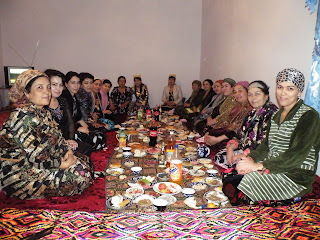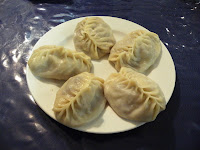
Nothing is better than feeding other people fermented mare's milk for the first time. NOTHING.
Making the golden journey without a single camel
 Above: Uzbek ladies know how to party! Correct technique for a bridal welcome party: dump the boys in a skanky dark room to drink vodka and be manly, then assemble in a huge room with delicious food and even more vodka. Eat food, drink vodka. Repeat. The two ladies sitting at the far end of the table are the brides.
Above: Uzbek ladies know how to party! Correct technique for a bridal welcome party: dump the boys in a skanky dark room to drink vodka and be manly, then assemble in a huge room with delicious food and even more vodka. Eat food, drink vodka. Repeat. The two ladies sitting at the far end of the table are the brides. So, I think I have been extremely remiss so far in devoting little or no commentary to the wonders of Central Asian cuisine. Possibly that's because "wonders" is a bit of a strong word. The food here is often delicious but, as I may have mentioned once or twice before, the base elements of the local food constitute mutton and, well, mutton fat. Sheep are prized for the size of their booty (the specimen on the left sports a particularly fine example) and fatty meat is much more expensive to buy than lean. The results can politely be described as "hearty", and you quickly become closely acquainted with the very special sensation of congealed mutton fat coating the roof of your mouth. And while home-cooked food is almost inevitably great, restaurants haven't really got the hang of variety, so you can easily find yourself carefully rotating the same four or five meals over and over again in order to avoid eating plov for two straight meals in a row and thus losing the ability to move for the next forty eight hours.
So, I think I have been extremely remiss so far in devoting little or no commentary to the wonders of Central Asian cuisine. Possibly that's because "wonders" is a bit of a strong word. The food here is often delicious but, as I may have mentioned once or twice before, the base elements of the local food constitute mutton and, well, mutton fat. Sheep are prized for the size of their booty (the specimen on the left sports a particularly fine example) and fatty meat is much more expensive to buy than lean. The results can politely be described as "hearty", and you quickly become closely acquainted with the very special sensation of congealed mutton fat coating the roof of your mouth. And while home-cooked food is almost inevitably great, restaurants haven't really got the hang of variety, so you can easily find yourself carefully rotating the same four or five meals over and over again in order to avoid eating plov for two straight meals in a row and thus losing the ability to move for the next forty eight hours. Flavouring is bizarrely hit-or-miss. The most commonly-used herb is dill, in what seems to me to be unecessarily large quantities; garlic makes an occasional appearance and while there might be a hot and spicy sauce on the table if you are lucky, the food in general errs on the side of blandness. Everything is served with bread, round, cooked in a clay oven andspectacularly moreish when fresh, less so when stale or made with mutton fat (no, seriously. In everything.). Vegetables are rather an afterthought although salads can get quite creative (too often drowned in mayonnaise though); fruit on the other hand is so good in season that I don't think I'll be able to bear going back to stuff we get at home.
Flavouring is bizarrely hit-or-miss. The most commonly-used herb is dill, in what seems to me to be unecessarily large quantities; garlic makes an occasional appearance and while there might be a hot and spicy sauce on the table if you are lucky, the food in general errs on the side of blandness. Everything is served with bread, round, cooked in a clay oven andspectacularly moreish when fresh, less so when stale or made with mutton fat (no, seriously. In everything.). Vegetables are rather an afterthought although salads can get quite creative (too often drowned in mayonnaise though); fruit on the other hand is so good in season that I don't think I'll be able to bear going back to stuff we get at home. Plov:
Plov: Laghman:
Laghman: Manty:
Manty: Shashlik:
Shashlik: Shorpa:
Shorpa: Halim:
Halim: This is how it looked when we were there:
This is how it looked when we were there: The similarities are, you must concede, striking.
The similarities are, you must concede, striking.In Europe and America people in a train travel in a train fully aware that it belongs either to a state or company and that their ticket grants them only temporary occupation and certain restricted rights. In Russia people just take them over.-- Laurens van der Post, Journey into Russia
 The problem with Kazakhstan is that it is a sodding big country. It is approximately the size of Western Europe, except with a population of only about fifteen million and not an awful lot going on apart from a lot of steppe. Aktau on the Caspian is, according to my Beacon of Progress map, at least 1000 km from the nearest town of interest, and my own particular interest lay with the Kyrgyz consulate in Almaty, over 2000km away on the other side of the country (3000 km travelling distance. The placement of transport links here is somewhat eccentric.). Since internal flights are not exactly cheap and buses non-existent, I was obliged to grit my teeth for the four-day-three-night marathon train journey.
The problem with Kazakhstan is that it is a sodding big country. It is approximately the size of Western Europe, except with a population of only about fifteen million and not an awful lot going on apart from a lot of steppe. Aktau on the Caspian is, according to my Beacon of Progress map, at least 1000 km from the nearest town of interest, and my own particular interest lay with the Kyrgyz consulate in Almaty, over 2000km away on the other side of the country (3000 km travelling distance. The placement of transport links here is somewhat eccentric.). Since internal flights are not exactly cheap and buses non-existent, I was obliged to grit my teeth for the four-day-three-night marathon train journey.